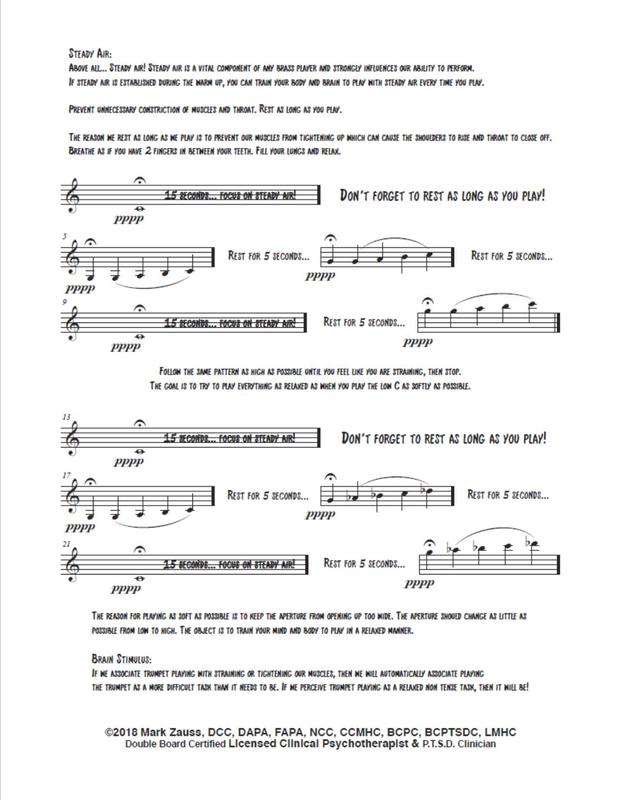Range Building Exercise - Play with less effort in the upper register. PDF & Video instruction.1/21/2018 This blog entry is a basic range building exercise is included as well as a discussion about the psychological and physiological processes that may help reduce tenseness when playing in the upper register. This includes a video demonstration and free downloadable PDF file. Why it's so important to not play tense. As a clinical psychotherapist and professional trumpet player, I discovered that when trumpet players become tense, the tension in their shoulders and the back of neck significantly increases which effects our ability to perform. Tension can adversely impact effect our flexibility, pitch, accuracy and range. When the muscles in the back of the neck become tense, the parasympathetic nerves that run adjacent to the cranial nerves can become inflamed. This inflammation can affect the trigeminal nerves in the face to become fatigued which can decrease endurance. The parasympathetic nerves which affect the middle ear can also be impacted by causing the pressure to change in the middle ear. This can cause us not to be able to hear as well when we become tense. When we cannot hear as well, we have the tendency to over blow which can cause changes in the aperture. These are only a few reasons that explain the importance of why we should practice how not to be tense. This method includes specific examples of how to decrease the tenseness in our body and improve range by playing in a relaxed manner. This method is not comprehensive, but shows the basic technique of how to play in a non tense manner.
Break the cycle: Be conscious of your tenseness or it will continue. Playing tense can form into a habit and actually feel normal. Awareness is the first step towards change. Once you discover what being tense means you can take charge and apply the tools you learn to play in a relaxed manner. Every one is different but it typically takes about 30 days to develop a new positive habit of playing relaxed. If someone has been playing tense for a long time, they can subconsciously become tense when only thinking of the trumpet. It takes time to re-lean a new habit and undo the old one. Eventually the new habit will sink in and playing becomes easier. Steady Air: Above all – Steady air. Steady air is a vital component of any brass player and strongly influences our ability to perform. If steady air is established during the warm up, you can train your body and brain to play with steady air every time you play. The exercise in this blog focuses on steady air. Prevent unnecessary constriction of muscles and throat. Rest as long as you play. The reason we rest as long as we play is to prevent our muscles from tightening up which can cause the shoulders to rise and throat to close off. Breathe as if you have 2 fingers in between your teeth. Fill your lungs and relax. Focus on steady air - always. Click file below to Download PDF file of the Zauss Range Building exercise - (Free)
Range Building exercise. Click Image Below for PDF file
|
Archives
April 2020
Mark ZaussTrumpet player, Licensed clinical psychotherapist. Categories
All
|
||||||||
